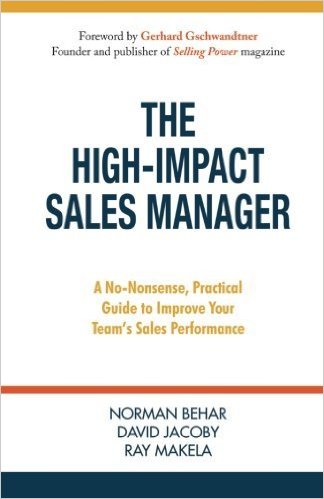Congratulations you are a Sales Manager…now what?
Only 40% of sales teams will achieve plan this year on average. Why will 60% of sales teams fail to hit plan this year? Have you recently been promoted to sales manager and you find yourself saying now what? Do you have sales managers reporting to you and you lack a sales background? Are you a sales manager looking for a road map on how to add the most value? If so this post is for you.
I just finished the book: The High Impact Sales Manager, a no-nonsense, practical guide to improve your team’s performance. The authors from the Sales Readiness Group defined the role of sales manager and built a strong foundation that defines the sales manager role and helps new sales managers have the greatest impact.
Where do most sales managers come from? Sales managers are often sales super stars who are promoted into management with little training and plan to achieve the sales goal. I have seen it repeated over and over again in the past 30 plus years…. A company has a sales super star that consistently hits or surpasses sales plan. They open more new business than their other team members, sell more new products at launch and their customers love them. The leaders of the company want every salesperson performing at their level so they promote the sales super star with the vision they will help the entire team operate as they have done. However in the majority of these cases the new sales manager will fail. Why? This was your sales super star eight months ago…what changed? More important, what can we do to set new sales managers up to win in their role?
The authors describe the scenario of the top sales producer becoming the sales manager as the “Star Athlete Syndrome”. The sales star consistently produces to plan but grows tired of the daily grind of sales. They dream of moving up in the organization. After all how hard could sales management be? It sounds easy, almost intuitive…I know how to sell, I have demonstrated the ability to sell, …I can be a sales manager. If it is so easy why do so many sales super stars fail in the role of sales manager?
Answer: As a sales super star you drive results on your own. As a sales manager you must lead a team and drive results through (I prefer with) other people.
What is the definition of a sales manager?
A sales manager, someone who directs an organization’s sales team, oversees its processes, and is typically in charge of talent development and leadership, benefits by having clarity into the company’s future. As a sales manager oversees a company’s operations, an effective sales management process will allow them to drive their company forward. They’ll have a clearer vision of where they stand amongst their competition and know how to stay above their competition.
The key words in this definition include: process, oversees, talent development and vision.
Let’s take a deeper dive into the roles of salespeople and sales managers in hopes of determining why the star athlete syndrome occurs so often.
To be an effective salesperson you need the following skills:
- Prospecting
- Questioning and Qualifying
- Listening
- Strong communication skills
- Time management
- Product knowledge
What skills are required to be an effective sales manager?
- Setting goals and objectives
- Recruiting and hiring
- Coaching
- Sales Performance Management
- Leadership
- Team time management
- Industry/Market knowledge
Can you see how there is a skills disconnect between a star salesperson and a sales manager? Is it any wonder sales managers who are not trained fail to produce high impact results?
The Authors of The High Impact Sales Manager do a great job of discussing this skills gap and they present a roadmap to becoming a top producing sales manager. I highly recommend this short book.
How about your team…
Will your sales team achieve sales plan this year?
Has your sales manager received training?
What are the most important tasks of a high impact sales manager?
If you research the word “sales “you will find millions of articles and advice on selling. If you look for “sales management” there is much less content and the content that does exist applies more to “general management” and not specifically sales management. This book will establish a foundation your sales managers can build upon and help them focus on the right activities and not get sucked into the daily grind and firefighting.



